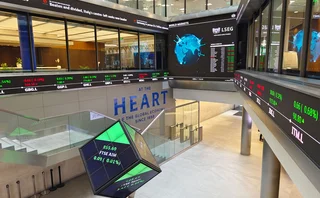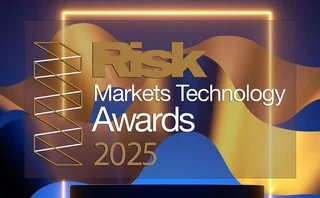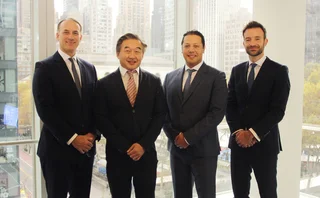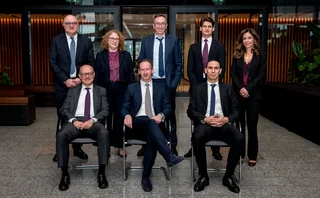
Regional house of the year: DBS Bank
Asia Risk Awards 2017
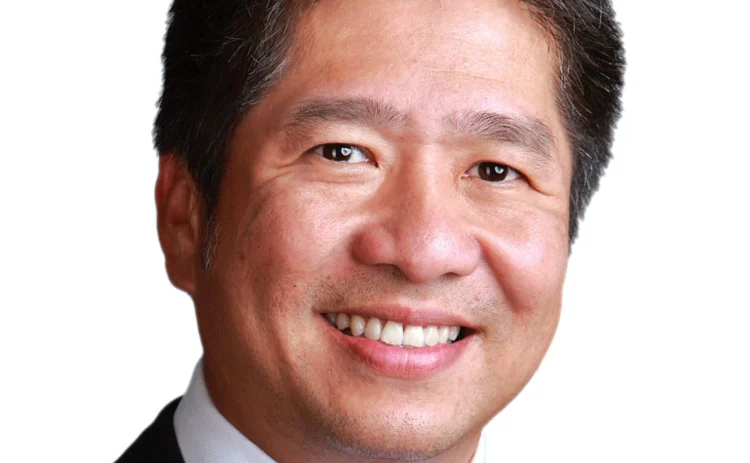
It has been a busy and eventful year for DBS, despite a tepid economic growth backdrop in Asia. As one of the top regional players, the Singaporean bank has explored new initiatives to improve its operating performance and cost efficiencies. At the same time, it has made significant inroads into key markets, including South Korea and China, thanks to the introduction of new products and a concerted effort to grab market share from its competitors in those regions.
Looking ahead, Thio Tse Chong, DBS managing director of treasury and markets in Singapore, highlights two broad themes for its business: the rise of wealth in Asia and the shifting investment appetites among financial institutions in the northeast Asia region.
“Countries where you see the fastest growth in savings and high-net-worth wealth in Asia continue to be the main drivers of our business,” he says. “Aside from the financial institutions market where our focus is broad-based, we are also seeing greater engagement from hedge funds in Asian markets given the vibrant trading opportunities over the last eight to nine months.”
A key event for DBS in the past 12 months was the purchase – in October 2016 – of ANZ, which allowed the bank to add 1.3 million customers and S$23 billion ($17 billion) in assets under management to its book. Since then, DBS has been integrating the portfolio into its business. China was first to complete the migration in July, followed by Singapore in August. Hong Kong was the latest to join, with Taiwan and Indonesia on the way.
Outside of acquisitions, DBS has been keen to organically grow its customer base and drive more volumes through its platform by improving the level of service it offers clients. This was the thinking behind a new Financial Markets Advisory (FMA) team the bank set up at the start of 2016 to provide external clients with services and tools for navigating the onslaught of new regulations that have been coming to the market. Chong says this endeavour is now starting to yield fruits and has been particularly valuable for clients trying to get to grips with the new margining rules.
“There has been a growth in our business as a direct result of the services provided by the FMA team. Derivative trades have increased and we are also getting some work on portfolio optimisation for high-quality liquid assets (HQLA),” he says. “We have had particularly good traction with large and medium-sized regional banks, which are facing particular difficulties because of all the new regulation.”
The figures speak for themselves: a 24% increase in turnover for swaps during the first half of the year compared with the same period for 2016; and a 72% increase in currency forwards. Over the past three years, DBS’s institutional client base has doubled, with an increase in revenue of 188%.
DBS has also been at the forefront of reinvigorating investor demand in the structured debt market, particularly asset-backed securities. After securing a sub-underwriting licence in China, the bank has closed three major Chinese automotive ABS deals.
“It took us a long time to get things going, but we have now seen greater traction in China and India, where ABS is viewed as a good alternative funding instrument in light of very strong economic growth in Asia over the last five years,” says Chong. “On the ABS front, we are having greater success in more countries, giving us a much wider and diverse client base.”
DBS’s Korean operations have proven to be especially resilient at a time when foreign banks in the country have been struggling to turn a profit in the region as a result of record low interest rates and tightening regulation. Last year, Goldman Sachs, BBVA and RBS pulled out of the country. In contrast, DBS says it saw record revenues in Korea in 2016 due to a diversified and expanded client base.

Alex Kim, sales head for treasury and markets in Korea, says the poor market performance in fixed income over the past year has led investors to search for new opportunities.
“The major shift by financial institutions has been to move away from fixed income into other asset classes, due to regulatory changes and weak prospects in this asset class. But our main driver in Korea is still structured interest rate products, as well as some hybrids. We are focusing more on Korean won structured products rather than US dollar products, as that is where the investment appetite is currently,” he says.
On the other hand, there were some major challenges along the way. The new International Financial Reporting Standard for insurance contracts – IFRS 17 – negatively impacted appetite for structured products among a core group of DBS’s clients. At the same time, investors have been reluctant to execute new trades due to the interest rate hike expectation in the US, prompting them to switch to equity and alternative investments.
DBS Korea was also highly active in cross-asset structuring. By using its holdings in Singapore government securities, the bank intends to provide cheaper financing tools and enhance its counterparty’s liquidity coverage ratio while minimising the impact to its own LCR and avoiding taking on additional market risk.
“We also plan to provide customised solutions such as Singapore loans and swaps and HQLA optimisation service to accommodate clients’ needs,” says Kim.
As for China, capital outflow controls and the restriction in renminbi transfers overseas was a dominant theme, leading onshore clients with overseas exposure to seek structured cost saving strategies with DBS. At the same time, the bank’s treasury operations in Hong Kong spotted a distortion of the funding cost between onshore and offshore markets.
In one notable deal, a Chinese client approached DBS late last year to look for a solution to finance an acquisition in Europe. Instead of offering the client a direct euro loan offshore, DBS suggested funds could be raised onshore at a cheaper rate before being transferred to Hong Kong then swapped into euro. As a result of this transaction, the client was able to save between 1% and 2% per year on the loan, compared with drawing directly from the European market.
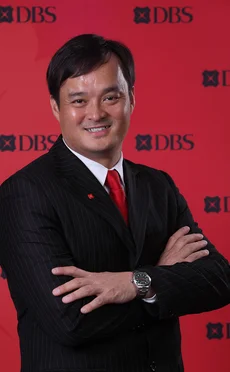
“There is a lot of growth potential for forex and cross-currency swap products in China. The issuers do not tend to just do simple swaps – depending on the tenor, they would probably opt for some structure with an option so they can cut down on the hedging costs. We have been able to do more of this kind of arrangement with our customers,” says Tak Lap Leung, head of treasury and markets for DBS Hong Kong.
The bank has also identified a key niche market in the Chinese retail segment, offering sophisticated wealth management products to high-net-worth clients.
One product that proved particularly popular was a delta one derivative that precisely replicated the price movement of underlying stocks and exchange-traded funds from overseas, principally in Hong Kong and the US. This avoided the need for cash settlement of the stock. The investment tenor for these products is typically between three and six months.
One of the main advantages of this kind of structure is that it allows investors to gain exposure to the attractive returns of high-flying stocks from abroad, while also keeping all funds onshore to comply with China’s tightening regulations.
While the structure of the product is relatively straightforward, DBS says the difficult part is in building up a comprehensive framework that covers customer selection, the selling procedure and risk control in an end-to-end process. Wayne Ying Hua, head of advisory sales for DBS in the country, says this took many years of experience in local wealth management to develop and enhance. Hua says that, as a result, DBS China is one of the few banks to offer this kind of product.
“Even though we are relatively small in China we are actively trying to grow the franchise to capitalise on the wealth accumulation of individual customers. Investors’ appetite and sophistication is increasing all the time and we are one of the leaders in structuring these types of investment products,” says Hua.
Only users who have a paid subscription or are part of a corporate subscription are able to print or copy content.
To access these options, along with all other subscription benefits, please contact info@risk.net or view our subscription options here: http://subscriptions.risk.net/subscribe
You are currently unable to print this content. Please contact info@risk.net to find out more.
You are currently unable to copy this content. Please contact info@risk.net to find out more.
Copyright Infopro Digital Limited. All rights reserved.
As outlined in our terms and conditions, https://www.infopro-digital.com/terms-and-conditions/subscriptions/ (point 2.4), printing is limited to a single copy.
If you would like to purchase additional rights please email info@risk.net
Copyright Infopro Digital Limited. All rights reserved.
You may share this content using our article tools. As outlined in our terms and conditions, https://www.infopro-digital.com/terms-and-conditions/subscriptions/ (clause 2.4), an Authorised User may only make one copy of the materials for their own personal use. You must also comply with the restrictions in clause 2.5.
If you would like to purchase additional rights please email info@risk.net
More on Awards
Clearing house of the year: LCH
Risk Awards 2025: LCH outshines rivals in its commitment to innovation and co-operation with clearing members
Best use of machine learning/AI: CompatibL
CompatibL’s groundbreaking use of LLMs for automated trade entry earned the Best use of machine learning/AI award at the 2025 Risk Markets Technology Awards, redefining speed and reliability in what-if analytics
Markets Technology Awards 2025 winners’ review
Vendors jockeying for position in this year’s MTAs, as banks and regulators take aim at counterparty blind spots
Equity derivatives house of the year: Bank of America
Risk Awards 2025: Bank gains plaudits – and profits – with enhanced product range, including new variants of short-vol structures and equity dispersion
Law firm of the year: Linklaters
Risk Awards 2025: Law firm’s work helped buttress markets for credit derivatives, clearing and digital assets
Derivatives house of the year: UBS
Risk Awards 2025: Mega-merger expected to add $1 billion to markets revenues, via 30 integration projects
Interest rate derivatives house of the year: JP Morgan
Risk Awards 2025: Steepener hedges and Spire novations helped clients navigate shifting rates regime
Currency derivatives house of the year: UBS
Risk Awards 2025: Access to wealth management client base helped Swiss bank to recycle volatility and provide accurate pricing for a range of FX structures
